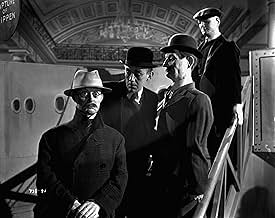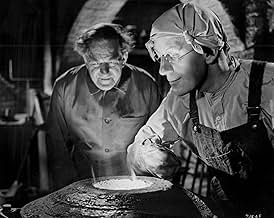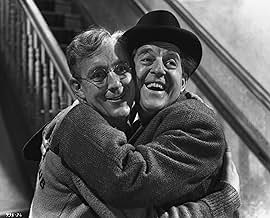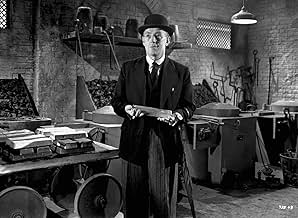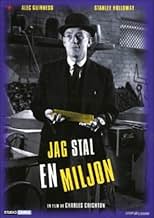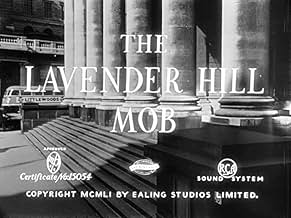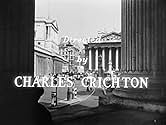Ein sanftmütiger Bankangestellter, der den Versand von Goldbarren beaufsichtigt, tut sich mit einem exzentrischen Nachbarn zusammen, um Goldbarren zu stehlen und sie als Miniatur-Eiffeltürme... Alles lesenEin sanftmütiger Bankangestellter, der den Versand von Goldbarren beaufsichtigt, tut sich mit einem exzentrischen Nachbarn zusammen, um Goldbarren zu stehlen und sie als Miniatur-Eiffeltürme außer Landes zu schmuggeln.Ein sanftmütiger Bankangestellter, der den Versand von Goldbarren beaufsichtigt, tut sich mit einem exzentrischen Nachbarn zusammen, um Goldbarren zu stehlen und sie als Miniatur-Eiffeltürme außer Landes zu schmuggeln.
- 1 Oscar gewonnen
- 5 Gewinne & 4 Nominierungen insgesamt
Empfohlene Bewertungen
Directed by Charles Crichton and written by T.E. Clarke, this is a fun movie that in spite of the years since it was filmed, it still charms its audiences, young and old.
The background is a London, right after the war. The film is original in that it takes us all over the city to places that one can identify so clearly, even after more than 50 years! It speaks of how careful are the English not to destroy their monuments.
As the would be robbers, Henry "Dutch" Holland is a man with a plan. He recognizes in his neighbor of the Lavender Hill rooming house, Alfred Pendlebury, a kindred soul that will see his proposal of how to steal the precious gold bullion from the Bank of England. It's a big operation, yet, only four people are needed to carry on the job.
This is a comedy of errors, where the best laid plans go awry in the small details the gang hadn't planned. The sure thing becomes a dead giveaway to the authorities once Holland and Pendlebury decide to go after the souvenir one young student bought in Paris that is part of the loot. Prior to that, the scenes in Paris at the Eiffel Tower was an original sequence for a movie that relies on intelligence rather than in overblown special effects.
Alec Guinness is charming as the master mind behind the heist. Stanley Holloway, a great English actor is magnificent as the man with an artistic eye, who almost derails the operation. Sid James and Alfie Bass contribute to make the film the joy it is with their comic presence. In a small cameo that comes and goes so quickly, we watch a young and elegant Audrey Hepburn makes an graceful appearance.
This is a film for all Ealing fans of all ages.
Painting and sculpture were Pendlebury's wings, his escape from his "unspeakably hideous" business occupation. But when Holland delicately introduces him to his own dream of twenty years' to escape - and not just metaphorically - from life as a nonentity, Pendlebury is drawn in. The scenes in the Balmoral Private Hotel in Lavender Hill are outstanding, and the sparse dialogue allows Alec Guinness and Stanley Holloway to shine as Holland suggests to Pendlebury how gold might be smuggled out of the country. "Hohohoho; By Jove, Holland, it is a good job we are both honest men." "It is indeed, Pendlebury."
Later in the film, the plot stands less well up to scrutiny but Guinness and Holloway are easily able to carry the viewers' attention. Chases that turn into farces often don't work in this style of British film, but here again Holland and Pendlebury carry such energy and excitement that they fit in well, and I am sure that even in nineteen fifties Britain, large numbers of the audience will have grasped the ironic humour of the policeman singing "Old MacDonald," in addition to those laughing at the straightforward ludicrousness of the scene.
Aficionados of British postwar comedy will enjoy this film, and because it lacks the dryness of say, "Kind Hearts and Coronets" or "The Ladykillers" it provides a more accessible introduction for those who are new to this most wonderful of genres.
The Lavender Hill Mob is about a bank clerk (Alec Guinness) that, with the aid of his friend Alfred Pendlebury (Stanley Holloway), a man that makes paperweights in the shape of the Eiffel tower, has an ingenious idea of how to rob his own bank. The two realise that the bank cannot be robbed by just them, so they set a trap to catch a couple of criminals, and once they've recruited them; The Lavender Hill Mob is born.
Alec Guinness, a regular of Ealing comedies and a man that I think is worthy of the title "the greatest actor of all time" shines, as usual, in this movie. Alec Guinness manages to hit the tone of his character just right; he is suitably creepy, as he is, a criminal, and yet at the same time he's also eccentric enough to be considered an upstanding citizen and bank clerk. Guinness is, however, not the only actor who's performance in this movie is worthy of acclaim, the entire cast shine in their respective roles; Stanley Holloway is more subdued in his role, but that's also suited to his character. There are also excellent support performances from Sid James, who is mostly remembered for his work on the 'Carry on' films; Alfie Bass, whom fans of British comedy TV will remember from the series "Are You Being Served" and there's also a very small role for Audrey Hepburn, who's movie legacy is legendary.
The Lavender Hill Mob also features many memorable moments that will stick in the viewers' mind long after the film has ended. Parts of the film such as the chase on the Eiffel tower and the way that the two central characters manage to loose the entire police force are legendary. The Lavender Hill Mob is a small movie, but it's a movie that aims big and it works a treat. This movie also features a brilliant twist ending that rivals the one in the superb 'Kind Hearts and Coronets'.
Overall, The Lavender Hill Mob is, despite its low budget and short running time, a spectacular comedy film that should not be missed by anyone.
The plot, briefly, involves a clever bank clerk (Guiness) developing a plan with a die caster (Holloway) to steal several million pounds of gold bullion, recast it into tourist knicknacks in the shape of Eiffel Tower paperweights, and ship it to Paris to sell on the black market. They recruit two professional thieves to help them.
It may not be Ealing's best comedy (my vote would be for "The Lady Killers") but it's more than funny enough. I'll just give three scenes as examples.
(1) Holloway and Guiness, two honest men, need to recruit what they call a "mob" but have no idea how to go about it. What I mean is -- how would YOU go about recruiting criminal assistants? What they do is go to crowded places of low repute -- saloons, prize fights, the underground -- and shout at each other through the noise about the safe being broken at such-and-such an address and all that money having to be left in it. Then they hole up at the address and wait for the burglars to arrive.
(2) A scene at the Eiffel Tower in which they discover that half a dozen of the gold paperweights instead of the usual leaden ones have been sold to some English schoolgirls. They watch horrified as the door closes and the elevator carrying the girls begins its descent, and they decide to rush down the tightly spiraling staircase to ground level, trying to beat the elevator. By the time they reach the street they've been spun around so many times that they can't stop laughing and are unable to stop twirling around until they fall down.
(3) After the robbery, in an empty warehouse soon to be searched by the police, Guiness must be tied up, gagged, and blindfolded with tape. Then his clothes must be torn and dirtied so that it appears he put up a fight before the gold was taken. But the police arrive too soon, and the others beat it, leaving Guiness standing alone, tied up, and blindfolded, but not dirty. He stumbles about blindly, trying to blow the tape from his mouth, getting his feet caught in discarded bicycle wheels, until he falls into the Thames.
Probably the weakest part of the movie is near the end, when police cars wind up chasing one another because of confusing messages. The scene could have been lifted from Laurel and Hardy. It's a little silly. (Why didn't Guiness and Holloway park the stolen car, get out, and walk away?) But that's a minor consideration.
What surprises me about some of these comedies is that they're able to make us laugh despite the dreary atmosphere. The streets of London look awfully dismal in this grainy black and white film. Some of them were still charred wrecks left over from the Blitz. But it doesn't dampen the comedy at all. Following the successful robbery a drunken Guiness and Holloway return to their boarding house to be chided by their landlady for being "naughty". One pulls the other aside, chuckling conspiratorially, and the two agree to call each other "Al" and "Dutch" -- two REAL BIG gangsters for you.
If you need to use up some neuropeptides this is your movie.
Wusstest du schon
- WissenswertesAudrey Hepburn (Chiquita) was considered for a larger role in this movie, but stage work made her unavailable. Sir Alec Guinness was impressed with the young actress and arranged for her to appear in a bit part. This is considered to be Hepburn's first appearance in a major movie.
- PatzerDuring the chase, the license plate on the armored truck is LKL238. The police officer correctly reports the license plate as LKL238. However, when the dispatcher repeats the license plate, he says LKL638.
- Zitate
Henry Holland: A minute later, the guard will appear around this corner, and you, Pendlebury, will detain him for at least half a minute. Ask him for a light, ask him the way, ask him anything, but keep him there, we must have those thirty seconds.
Pendlebury: Edgar.
Henry Holland: I beg your pardon?
Pendlebury: Isn't one supposed to say that when one's being briefed? On my rare visits to the cinema...
Henry Holland: The word is "roger."
Pendlebury: Oh, roger. How silly of me.
Top-Auswahl
Details
- Erscheinungsdatum
- Herkunftsland
- Offizieller Standort
- Sprachen
- Auch bekannt als
- Das Glück kam über Nacht - Einmal Millionär sein
- Drehorte
- Gunnersbury Park, London, England, Vereinigtes Königreich(Police Exhibition)
- Produktionsfirmen
- Weitere beteiligte Unternehmen bei IMDbPro anzeigen
Box Office
- Bruttoertrag in den USA und Kanada
- 16.361 $
- Eröffnungswochenende in den USA und in Kanada
- 5.524 $
- 12. Mai 2024
- Weltweiter Bruttoertrag
- 32.232 $
- Laufzeit1 Stunde 18 Minuten
- Farbe
- Seitenverhältnis
- 1.37 : 1
Zu dieser Seite beitragen




